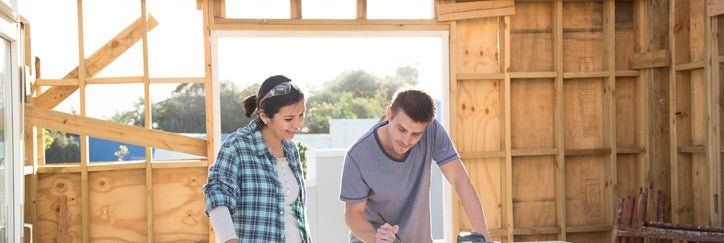18 States Where It's Cheaper to Build Than Buy a House
KEY POINTS
- Hawaii home buyers can save the most by opting for new construction.
- In the Midwest, it's still less expensive to buy an existing home.
- While building may be cheaper in some places, it's a lengthier process.
Depending on where you live, it's possible to save a chunk of cash by building instead of buying an existing home.
Potential home buyers will be interested to know that it's now cheaper to build a home in 18 states than it is to buy an existing one. An analysis conducted by StorageCafe, an online platform providing storage unit listings across the country, found that building from scratch can pay off in some parts of the country.
Details of the analysis
- Before diving in, it's important to note how StorageCafe came up with its numbers.
- Building costs were calculated as being the price of land, plus the median cost of a contract with builders. Another 10% was added in for additional costs, like permits, surveys, and fees for attorneys and real estate agents.
- Land costs are based on prices as of October 2022.
- Median contract prices for building are based on 2021 data, then adjusted for inflation at a rate of 8%.
- Existing home prices are based on October 2022 listings.
- The study included 46 states, as there was not sufficient data available for Alaska, North Dakota, Rhode Island, or Vermont. Washington D.C. and Puerto Rico were not considered.
Findings
The analysis found that building makes the most sense in areas of the country where home prices remain red hot. How much a buyer can save varies by state.
| State | Total Building Costs (Land, Construction, and Other Costs) | Median Single Family Home Listings Price | Difference Between Building vs. Buying Costs |
| Hawaii | $551,000 | $1,045,000 | $494,000 |
| California | $495,000 | $700,000 | $205,000 |
| Colorado | $492,000 | $600,000 | $108,000 |
| Utah | $538,000 | $635,000 | $97,000 |
| Virginia | $361,000 | $458,000 | $96,000 |
| Delaware | $394,000 | $490,000 | $96,000 |
| Maryland | $365,000 | $460,000 | $95,000 |
| Montana | $515,000 | $599,000 | $84,000 |
| Florida | $375,000 | $451,000 | $76,000 |
| Idaho | $505,000 | $575,000 | $70,000 |
| Washington | $493,000 | $559,000 | $66,000 |
| Massachusetts | $587,000 | $629,000 | $53,000 |
| Texas | $361,000 | $412,000 | $51,000 |
| Oregon | $502,000 | $545,000 | $43,000 |
| North Carolina | $363,000 | $395,000 | $32,000 |
| Georgia | $365,000 | $395,000 | $30,000 |
| Tennessee | $361,000 | $374,000 | $13,000 |
| New York | $524,000 | $535,000 | $11,000 |
Reality
The StorageCafe findings are an excellent reminder for buyers. It's always a good idea to check current prices on both new and existing homes in an area. Of course, that's only if they can afford to wait for a new home to be built. On average, it takes nearly eight months to build a home from permits to completion.
There's also the issue of supply and demand. If home builders are inundated with jobs, prices may not drop low enough to justify building. On the other hand, if home builders are hungry for new work, the price point could make an eight-month wait worth the effort.
Where buying an existing home is still the cheapest option
Here's a sample of states in which home buyers are still better off taking out a mortgage for an existing home.
| State | Total Building Costs (Land, Construction, and Other Costs) | Median Single Family Home Listings Price | Difference Between Building vs. Buying Costs |
| Pennsylvania | $528,000 | $345,000 | $183,000 |
| Ohio | $450,000 | $272,000 | $178,000 |
| Illinois | $461,000 | $295,000 | $166,000 |
| Maine | $544,000 | $380,000 | $164,000 |
| Iowa | $460,000 | $299,000 | $161,000 |
| Missouri | $445,000 | $290,000 | $155,000 |
| Michigan | $452,000 | $299,000 | $153,000 |
| South Dakota | $479,000 | $335,000 | $144,000 |
| Indiana | $452,000 | $310,000 | $142,000 |
| West Virginia | $358,000 | $225,000 | $133,000 |
Remember, these are state averages and may not be representative of more or less expensive corners of the state.
Buying a home is a huge commitment. Once you've found a mortgage lender you like and know how much you plan to spend, take your time and figure out whether you're better off buying a home that's brand new or older.
Our Research Expert
Motley Fool Stock Disclosures
The Motley Fool has a disclosure policy.




